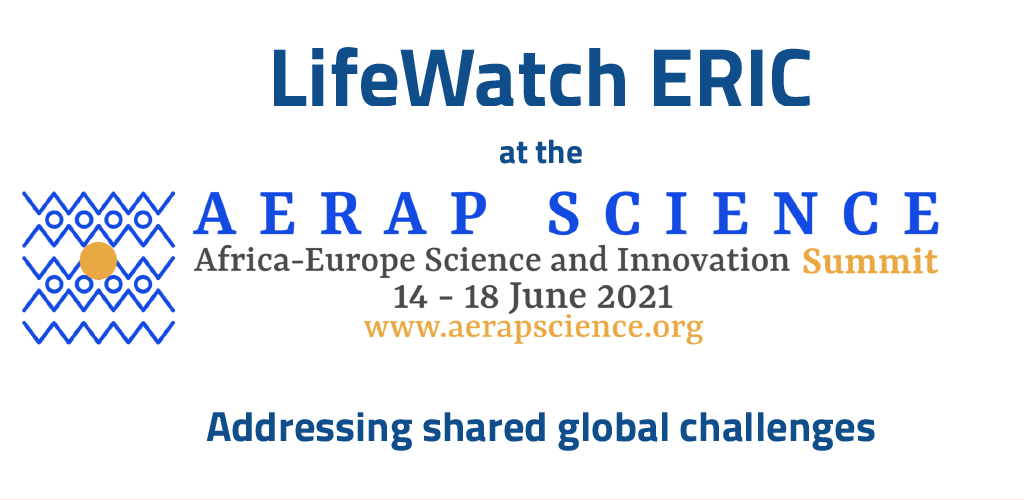
What a week! LifeWatch ERIC staff members participated in a total of 14 sessions across the Africa-Europe Science and Innovation Summit, hosted virtually by AERAP Science on 14-18 June 2021. 37 hours of presentations and discussions, all focused on improving knowledge transfer on science and innovation between Africa and Europe. This Summit drew on a range of processes, including AGENDA 2063, Africa’s blueprint and master plan for transforming Africa into the global powerhouse; the AU Science, Technology and Innovation Strategy for Africa 2024 (STISA-2024); and the European Commission Communication Towards a Comprehensive Strategy with Africa which foresees future cooperation built on five partnerships: green transition, digital transformation, growth and jobs, peace and governance and migration and mobility.
LifeWatch ERIC took part in sessions covering a range of topics, from Blockchain, to agri-food systems, to the Global Biodiversity Framework, featuring participation from CEO Christos Arvanitidis, CTO and ICT-Core Director Juan Miguel González-Aranda, CFO Lucas de Moncuit and Service Centre Director Alberto Basset, along with staff members from the ICT Core and the Service Centre: Elisa Morón-López, Antonio José Sáenz-Albanés, José Manuel Ávila, Javier López-Torres and Cosimo Vallo.
LifeWatch ERIC staff participated in 14 panels overall, alongside esteemed representatives from Europe and Africa, such as Tanya Abrahamse, CEO of GBIF; Intisar Soghayroun, Minister of High Education and Scientific Research of Sudan; Maria Cristina Russo, Director for International Cooperation in Research & Innovation at the European Comission; Clint García Alimandri of the Junta de Andalucia; Maxwell Otim, Director at the Ministry of Science, Technology and Innovation of Uganda; and many more. The Summit saw a large amount of support from LifeWatch ERIC, which also convened the discussion “Cooperation on Biodiversity and Ecosystems Services” alongside the South African Department of Science and Innovation. LifeWatch ERIC also participated in the last AERAP conference in September 2020.
You can view LifeWatch ERIC’s presentations below:
Elisa Morón-López, Lucas de Moncuit – Overview of European Science Programmes and Policies
Juan Miguel González-Aranda – Opening Plenary
Juan Miguel González-Aranda – Africa-Europe Geoscience Cooperation to Sustain our Planet
José Manuel Ávila – Developing a Skills Agenda that Works for Future Generations in Africa. Download PDF
Antonio José Sáenz-Albanés – Our Digital Future for our Citizens
Juan Miguel González-Aranda – Science Capacity Building in Africa
Christos Arvanitidis, Juan Miguel González-Aranda, Alberto Basset – Cooperation on Biodiversity and Ecosystems Services
José Manuel Ávila – Africa-Europe Research Cooperation for the Advancement of Agri-Food Systems. Download PDF
Christos Arvanitidis: Oceans of Cooperation
Antonio José Sáenz-Albanés, Juan Miguel González-Aranda – Building ICT Capacity
Juan Miguel González-Aranda – Science at the United Nations’ 76th General Assembly, September 2021: How Science Advances the SDGs
Juan Miguel González-Aranda, Antonio José Sáenz-Albanés – Blockchain in Africa
Javier López-Torres, Cosimo Vallo: Youth Challenge: Inspiring the Next Generation with the Schools Satellite Project. Download PDF
Christos Arvanitidis, Juan Miguel González-Aranda, Alberto Basset – Africa-Europe Cooperation on the Global Biodiversity Framework
Christos Arvanitidis, Juan Miguel González-Aranda, José Manuel Ávila (Download PDF) – Africa-Europe Partnering Together for Future Biodiversity Challenges: Consortia Building